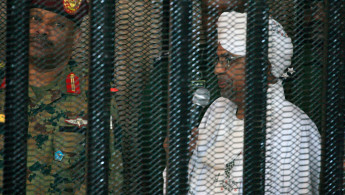Sudan seizes over one billion in assets from businessman linked to ousted dictator Bashir
Committee spokesperson Salah Manna said on Thursday that Hamza, who was part of the Sudanese army's Islamic movement under Bashir, had used his government influence to amass more than two billion dollars in wealth.
Hamza took advantage of his government position, Manna said, to control the telecommunications sector. An audit has now been ordered into MTN Sudan Ltd's accounts.
Hamza is described as the "financial manager of al-Bashir's family" by Sudan in The News.
Sudan also seized Hamza's shares in Salam Rotana Hotel and the Afra Mall - of which he owned large parts.
The committee said 79 properties were taken over, the total area of which exceeds 35 million square meters.
Member of the Sovereign Council Mohamed Al-Faki said on Thursday that the government will continue its efforts to seize all the funds that were siphoned off by Bashir and his regime and return them to the public treasury.
The Sudanese military ousted Bashir last year after months of street demonstrations.
Bashir, who is 76, was convicted on corruption charges in December and was sentenced to two years in jail.
At the time, the judiciary ordered the confiscation of 6.9 million euros, $351,770 and 5.7 million Sudanese pounds found at Bashir's home.
Bashir admitted to having received a total of $90 million from Saudi leaders and the trial centred on $25 million received from Saudi Arabia's de facto ruler Crown Prince Mohammed bin Salman.
Despite Sudan's political transition, which has raised hopes of more reforms, the economy remains in deep crisis. Many in Sudan still have to queue for hours to buy bread.
Read more: Sudan 'urgently needs $120 million' to avoid devastating virus outbreak
Sudanese authorities announced an increase in bread prices at the start of this month, meaning one Sudanese pound [about two US cents] now buys only a 50-gram loaf of bread, compared to one weighing 70 grams previously.
A tripling of the price of bread was the trigger for the first street protests against Bashir in December 2018.
Sudan agreed in February to hand Bashir and others to the International Criminal Court for alleged war crimes in Darfur but the ousted autocrat remains in prison in Khartoum.





 Follow the Middle East's top stories in English at The New Arab on Google News
Follow the Middle East's top stories in English at The New Arab on Google News
![The UAE is widely suspected of arming the RSF militia [Getty]](/sites/default/files/styles/image_330x185/public/2024-11/GettyImages-472529908.jpg?h=69f2b9d0&itok=Yauw3YTG)
![Netanyahu furiously denounced the ICC [Getty]](/sites/default/files/styles/image_330x185/public/2024-11/GettyImages-2169352575.jpg?h=199d8c1f&itok=-vRiruf5)
![Both Hamas and the Palestinian Authority welcomed the ICC arrest warrants [Getty]](/sites/default/files/styles/image_330x185/public/2024-11/GettyImages-2178351173.jpg?h=199d8c1f&itok=TV858iVg)